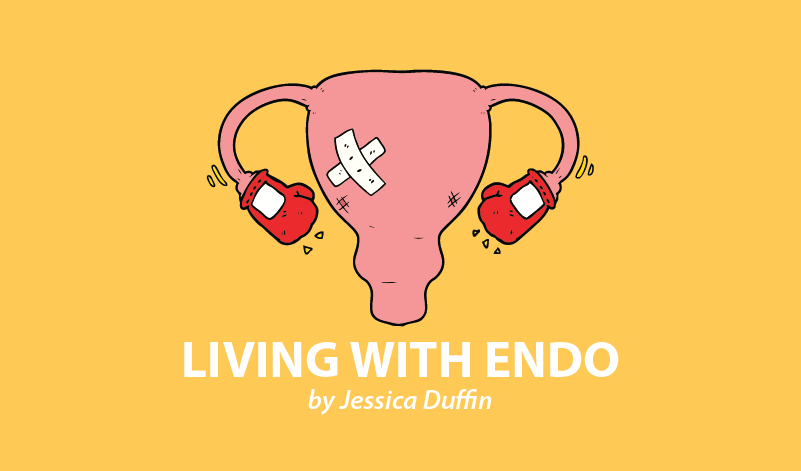
Last week, I wrote about how having a morning routine may help you manage the day ahead with your endometriosis symptoms, including brain fog, depression, and fatigue. The post was all about waking you up and helping you to feel stronger and positive.
This week I want to talk about having a night routine, and how having a better night’s sleep could help you manage some of your endometriosis symptoms.
As I’ve touched upon before, fatigue is a common symptom of endometriosis that can be a constant struggle for many of us. While fatigue is linked to the depression that can come with endometriosis as well as the internal battle our bodies are fighting, simple lack of good, quality sleep can have an effect as well.
Lack of sleep can cause some powerful changes in the brain. Before I began to really understand my symptoms and the conditions I was dealing with, I was completely unaware of how lack of sleep was affecting my ability to handle these.
I’d have days when, for no particular reason, my life just felt hopeless; I felt desperate and inexplicably miserable. I often entertained suicidal thoughts. Endometriosis felt like a death sentence and I couldn’t see how I would manage to keep my job.
Yet, some days I felt positive, full of hope and the strength and courage to fight. I saw solutions easily, and even when they seemed challenging, I was resourceful and determined.
These negative thoughts and feelings always, without fail, hit me like a ton of bricks the morning after a bad night’s sleep. I started to do some research, and realized it wasn’t just me being “weak.” Lack of sleep actually has a negative impact on our brains in several ways.
The area of our brain that is responsible for storing new information, the hippocampus, is affected to the point that we are unable to process this new data as successfully as we would if we had managed to get a good night’s sleep beforehand. Coupled with endo brain fog, general fatigue, and chronic pain, there’s a lot going on in our brains already. Adding lack of sleep could have a very real impact on our performance.
One of the effects, which I found the most interesting, was that lack of sleep actually can make us perceive life more negatively. When people are sleep-deprived, the amygdala, which is the part of the brain that controls our emotions, goes into overdrive. The connection to the area, which also helps regulate the amygdala, is reduced significantly, meaning our reaction to negative events is heightened and unrestricted, and we often find ourselves overreacting.
Additionally, our ability to make decisions, our problem-solving skills, and our reaction times are all reduced. So, overall, we’re struggling to perform and we’re reacting to life more negatively.
It’s no wonder, then, that I felt so hopeless about my life and my symptoms when I hadn’t been able to sleep. But why couldn’t I sleep in the first place?
Insomnia often is caused by an underlying issue such as stress, anxiety, depression, and unhelpful habits.
Endometriosis News reported in a previous article that, “Women with endometriosis have a higher risk of developing anxiety, depression, and other psychological symptoms.” So, these issues could be affecting our quality of sleep. The women I work with often talk to me about struggling to get enough sleep, and I personally rely on certain tools and resources to help me drift off.
Another reason endometriosis patients may find it difficult to sleep is what has been dubbed by the community as “painsomnia.” While all of our experiences are different, many deal with chronic pain, which can continue even as we try to sleep, causing sleepless nights or poor quality rest.
Often, people experiencing high stress or anxiety will continue worrying about things that are bothering them even as they climb into bed. When we’re in a negative place already due to pain or these mental symptoms, it can be easy to fall into a spiral of negative self-talk. Having a few go-to tools to help your body unwind can slow your mind down to help you feel more positive and, therefore, support you with these issues.
In the next part of this series on sleep and night routines, I’m going to take you through some of my favorite steps to help me relax and have a deeper night’s sleep. Hopefully, these tips will enable you to wake up feeling stronger and more positive about living life with endometriosis.
***
Note: Endometriosis News is strictly a news and information website about the disease. It does not provide medical advice, diagnosis, or treatment. This content is not intended to be a substitute for professional medical advice, diagnosis, or treatment. Always seek the advice of your physician or other qualified health provider with any questions you may have regarding a medical condition. Never disregard professional medical advice or delay in seeking it because of something you have read on this website. The opinions expressed in this column are not those of Endometriosis News or its parent company, BioNews Services, and are intended to spark discussion about issues pertaining to endometriosis.

